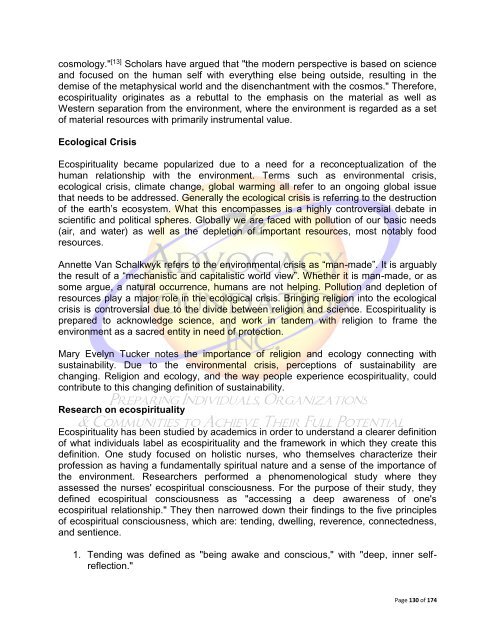The Gift of Spirituality
The Gift of Spirituality
The Gift of Spirituality
You also want an ePaper? Increase the reach of your titles
YUMPU automatically turns print PDFs into web optimized ePapers that Google loves.
cosmology." [13] Scholars have argued that "the modern perspective is based on science<br />
and focused on the human self with everything else being outside, resulting in the<br />
demise <strong>of</strong> the metaphysical world and the disenchantment with the cosmos." <strong>The</strong>refore,<br />
ecospirituality originates as a rebuttal to the emphasis on the material as well as<br />
Western separation from the environment, where the environment is regarded as a set<br />
<strong>of</strong> material resources with primarily instrumental value.<br />
Ecological Crisis<br />
Ecospirituality became popularized due to a need for a reconceptualization <strong>of</strong> the<br />
human relationship with the environment. Terms such as environmental crisis,<br />
ecological crisis, climate change, global warming all refer to an ongoing global issue<br />
that needs to be addressed. Generally the ecological crisis is referring to the destruction<br />
<strong>of</strong> the earth’s ecosystem. What this encompasses is a highly controversial debate in<br />
scientific and political spheres. Globally we are faced with pollution <strong>of</strong> our basic needs<br />
(air, and water) as well as the depletion <strong>of</strong> important resources, most notably food<br />
resources.<br />
Annette Van Schalkwyk refers to the environmental crisis as “man-made”. It is arguably<br />
the result <strong>of</strong> a “mechanistic and capitalistic world view”. Whether it is man-made, or as<br />
some argue, a natural occurrence, humans are not helping. Pollution and depletion <strong>of</strong><br />
resources play a major role in the ecological crisis. Bringing religion into the ecological<br />
crisis is controversial due to the divide between religion and science. Ecospirituality is<br />
prepared to acknowledge science, and work in tandem with religion to frame the<br />
environment as a sacred entity in need <strong>of</strong> protection.<br />
Mary Evelyn Tucker notes the importance <strong>of</strong> religion and ecology connecting with<br />
sustainability. Due to the environmental crisis, perceptions <strong>of</strong> sustainability are<br />
changing. Religion and ecology, and the way people experience ecospirituality, could<br />
contribute to this changing definition <strong>of</strong> sustainability.<br />
Research on ecospirituality<br />
Ecospirituality has been studied by academics in order to understand a clearer definition<br />
<strong>of</strong> what individuals label as ecospirituality and the framework in which they create this<br />
definition. One study focused on holistic nurses, who themselves characterize their<br />
pr<strong>of</strong>ession as having a fundamentally spiritual nature and a sense <strong>of</strong> the importance <strong>of</strong><br />
the environment. Researchers performed a phenomenological study where they<br />
assessed the nurses' ecospiritual consciousness. For the purpose <strong>of</strong> their study, they<br />
defined ecospiritual consciousness as "accessing a deep awareness <strong>of</strong> one's<br />
ecospiritual relationship." <strong>The</strong>y then narrowed down their findings to the five principles<br />
<strong>of</strong> ecospiritual consciousness, which are: tending, dwelling, reverence, connectedness,<br />
and sentience.<br />
1. Tending was defined as "being awake and conscious," with "deep, inner selfreflection."<br />
Page 130 <strong>of</strong> 174

















